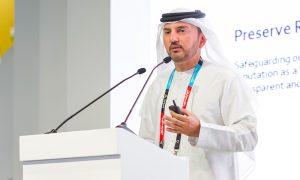Pinsent Masons: Tech a priority for almost all infrastructure investors
Increasing convergence of infrastructure and technology heavily reflected in new report

A new report by Pinsent Masons has revealed that globally, 87% of infrastructure investors would be more likely to back a bid in which a technology provider is a member of the consortium, rather than a sub-contractor.
The increasing convergence of infrastructure and technology is heavily reflected in the report findings. According to the ‘The Evolution of Infratech’ report, 43% of technology respondents anticipate entering a joint venture with an infrastructure company over the next three years, which is a 100% increase in comparison to their engagement over the past three years.
Infrastructure respondents also expected to partner with tech firms, with more than half – an increase of circa 50% – anticipating a joint venture within the next three years.
“For investors, having technology providers play a leadership role means there are real incentives motivating them to provide the best technology and speed up delivery. Our survey shows that 92% of infrastructure investors will often or always consider technology when making investment decisions over the next three years,” said Nick Ogden, infrastructure expert and partner at Pinsent Masons.
“This shows that investors are willing to spend the money which will drive this growing trend. Collaboration is already here, and is only going to increase. On projects where infrastructure and technology are truly integrated, you can imagine there is the potential not just to create more efficient assets but also create new markets that haven’t existed before.”
However, the report also pointed out obstacles to the convergence of infrastructure and technology, with both sets of respondents citing cultural differences as a major challenge to Infratech projects, once initiated.
37% of respondents also pointed out that the siloed approach to both sectors was a major barrier.
“Infrastructure needs to learn from tech firms and start changing from the inside-out by bringing technology into all aspects of their operation. Both sectors will need to bring together their commercial objectives, whilst understanding each other’s varied risk appetites, commercial drivers and business models,” Ogden added.
The second biggest challenge for projects where technology and infrastructure are integrated is agreeing data requirements and standards, the report added. Regulatory constraints ranked in third place, while a clear majority of participants – 91% – preferred an open access model with ownership of any data captured by Infratech.
However, the same respondents also reported that data captured by Infratech is available to all in just 62% of the projects they work on.
“Clear leadership is needed from governments to ensure that data and information security regulations are fit for purpose in order for the benefits of Infratech to be fully maximised. Despite the rapid pace of technological change and digital disruption, the UAE is a prime example of how beneficial Infratech can be when clear guidelines are put into place,” said Bill Smith, Dubai-based infrastructure partner at Pinsent Masons.
“The clear vision of both His Highness Sheikh Mohammed bin Rashid Al Maktoum, Vice President, Prime Minister and Ruler of Dubai, and the Dubai Government is to firmly cement Dubai’s place as a world-leading smart city,” he continued.
“Under their stewardship, we have seen Dubai take a leading role in embracing Infratech for the benefit of its residents: for example, by the establishment of Smart Dubai Government (SDG) whose express mission is to ‘deliver world-class smart services and infrastructure to create happiness’. This statement encapsulates the very essence of Infratech, and what it is intended to deliver into the future.”
The report also showed that monetising data from infrastructure comes fairly low on the list of ways Infratech is seen as adding value, mentioned by only 21% of all respondents. However, the law firm added that in its view, data will have significant potential as a revenue generator and that its value must not be overlooked.
“Data monetisation will become a more significant feature for those involved in Infratech, particularly once the opportunities and risks are better understood by the Infratech ecosystem, and robust data sharing arrangements and data standards are in place to support emerging business models,” added Simon Colvin, technology partner at Pinsent Masons.
“Across our global markets, we are seeing interesting PPP models emerge that incorporate data monetisation as part of the financial base case, so the success of the project will depend on revenue streams from data generated by project assets. This underlines the views of the investors, that there are new revenue streams and value to be driven out from this digital and data transformation,” he concluded.
























